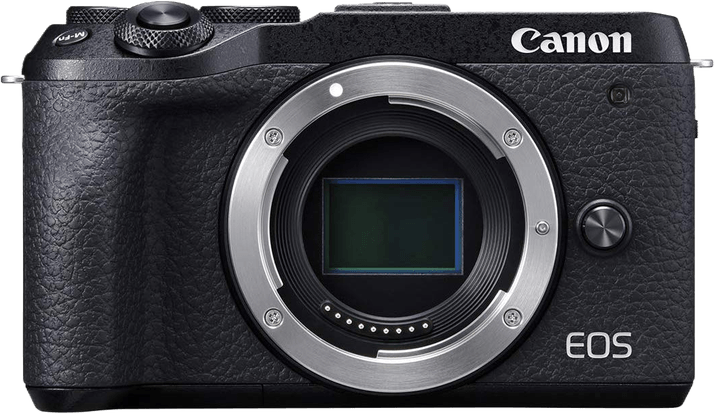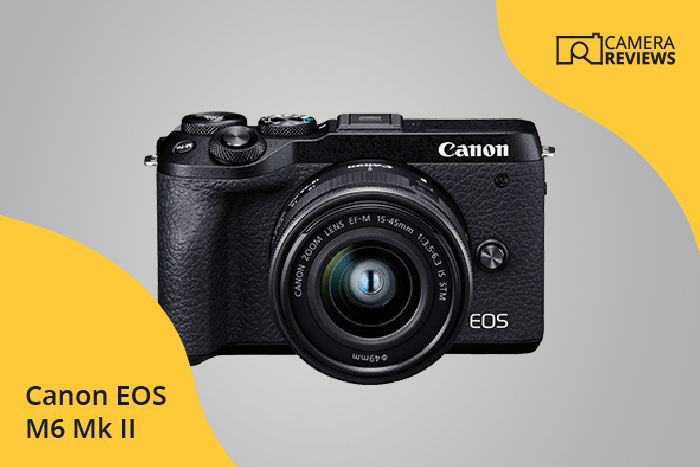Canon EOS M6 Mark II Specs and Scores

The Canon EOS M6 Mark II scores a solid 63/100 in our evaluation. Announced on August 28, 2019, this mirrorless camera is priced at $850, making it a competitive option in today’s market. With dimensions of 120 x 70 x 49mm and weighing 408g (0.90lbs), it offers a compact and lightweight design ideal for on-the-go photography.
Considering its specifications and launch price, the EOS M6 Mark II holds its own against other cameras in its category. This camera is a reliable choice for photographers looking for a balance between affordability and performance.
Canon EOS M6 Mark II Overview and Optics
The optics of the Canon EOS M6 Mark II receive a score of 62/100. This camera features a 33-megapixel APS-C CMOS sensor, which is paired with a Digic 8 processor. The sensor has a DXOMARK score of 58, indicating decent performance. The camera’s shooting speed is 14 frames per second, providing ample speed for capturing fast-moving subjects.
The Canon EOS M6 Mark II uses a Canon EF-M lens mount, which offers compatibility with a range of lenses designed specifically for Canon’s mirrorless cameras. However, it lacks image stabilization, which may lead to blurry images when shooting handheld or in low light conditions. The camera’s aspect ratio is 3:2, which is a standard format for digital photography.
When considering the optics of the Canon EOS M6 Mark II, it becomes evident that the camera offers solid performance in terms of image quality and speed. However, the lack of image stabilization may result in the need for additional equipment or techniques to ensure sharp images.
Canon EOS M6 Mark II Video Performance
The Canon EOS M6 Mark II boasts a video score of 91/100, reflecting its strong performance in the video capabilities department. This camera offers a maximum video resolution of 4K and dimensions of 3840 x 2160, ensuring high-quality footage. Additionally, the M6 Mark II supports a maximum video frame rate of 120fps, allowing for smooth slow-motion capture and a professional look.
Furthermore, this camera has a built-in time-lapse functionality, providing users with creative options for capturing dynamic and engaging videos. Given these specifications, the Canon EOS M6 Mark II stands as a competitive choice in today’s market, offering advanced features and excellent performance for videographers of all levels. The combination of high-resolution, fast frame rates, and time-lapse capabilities make it a reliable and versatile tool for capturing stunning video content.
Canon EOS M6 Mark II Features and Benefits
The Canon EOS M6 Mark II received a feature score of 70 out of 100. Its screen size measures 3 inches with a resolution of 1,040,000 dots. The camera offers a touchscreen and a flip screen, enhancing user experience while shooting at different angles. However, it lacks GPS capabilities. Connectivity options include both WIFI and Bluetooth, making it convenient for transferring files and remote control.
In today’s market, the Canon EOS M6 Mark II’s specifications are competitive. The touchscreen and flip screen offer versatility, while the absence of GPS is not a significant drawback for most users. The WIFI and Bluetooth capabilities ensure seamless connectivity and file sharing.
The Canon EOS M6 Mark II stands as a reliable option for photographers and videographers, with its versatile features and connectivity options. The feature score of 70 reflects its strengths as a camera.
Canon EOS M6 Mark II Storage and Battery
The Canon EOS M6 Mark II receives a storage and battery score of 35/100. The camera has a single memory card slot, which accepts SD, SDHC, and SDXC cards, with compatibility for faster UHS-II cards. However, the battery life is limited to 305 shots per charge, using the LP-E17 battery type. The camera does offer USB charging for added convenience.
In today’s market, the limited battery life and single memory card slot may not meet the expectations of some users, as many competitor cameras provide longer battery life and dual card slots. Despite these shortcomings, the Canon EOS M6 Mark II remains a viable option for those who prioritize other features over storage and battery capacity.
Canon EOS M6 Mark II Alternatives
Do you want to know how the Canon EOS M6 Mark II compares to its competitors? Have a look at the most popular comparisons for this camera below:
- Canon EOS M50 Mark II vs EOS M6 Mark II
- Canon EOS M6 Mark II vs Sony a7C
- Canon EOS M6 Mark II vs EOS R10
- Canon EOS M6 Mark II vs Sony a6400
- Canon EOS M5 vs EOS M6 Mark II
- Canon EOS M50 vs EOS M6 Mark II
Canon EOS M6 Mark II FAQ
Does the Canon EOS M6 Mark II Have Built-in Image Stabilization?
Unfortunately, the Canon EOS M6 Mark II does not have built-in image stabilization. However, it does support lens-based optical image stabilization for compatible lenses.
Does the Canon EOS M6 Mark II Support 4K Video Recording?
Yes, the Canon EOS M6 Mark II supports 4K video recording at 30fps, allowing for high-resolution video capture and enhanced video quality.
What Size Sensor Does The Canon EOS M6 Mark II Have?
The Canon EOS M6 Mark II features an APS-C size sensor, which is a popular choice for many DSLR and mirrorless cameras due to its excellent balance of image quality and compact size.
Does the Canon EOS M6 Mark II Have a Dual Memory Card Slot?
No, the Canon EOS M6 Mark II has a single memory card slot, which supports UHS-II SD cards for high-speed data transfer and storage.
Does the Canon EOS M6 Mark II Have a Touch Screen?
Yes, the Canon EOS M6 Mark II features a touch screen, which makes it easy to navigate menus, change settings, and focus on subjects with a simple tap.
Does the Canon EOS M6 Mark II Have Wi-Fi and Bluetooth?
Yes, the Canon EOS M6 Mark II has both Wi-Fi and Bluetooth connectivity, allowing for easy photo sharing, remote control, and connection to compatible devices.
Does the Canon EOS M6 Mark II Have GPS?
No, the Canon EOS M6 Mark II does not have built-in GPS functionality. However, you can add GPS data to your photos by connecting your camera to a compatible smartphone.
Is the Canon EOS M6 Mark II Weather Sealed?
No, the Canon EOS M6 Mark II is not weather sealed, so it is recommended to take precautions when using the camera in harsh or wet conditions.
Does the Canon EOS M6 Mark II Have a Built-in Flash?
Yes, the Canon EOS M6 Mark II has a built-in flash, providing convenience and flexibility for various lighting situations.

